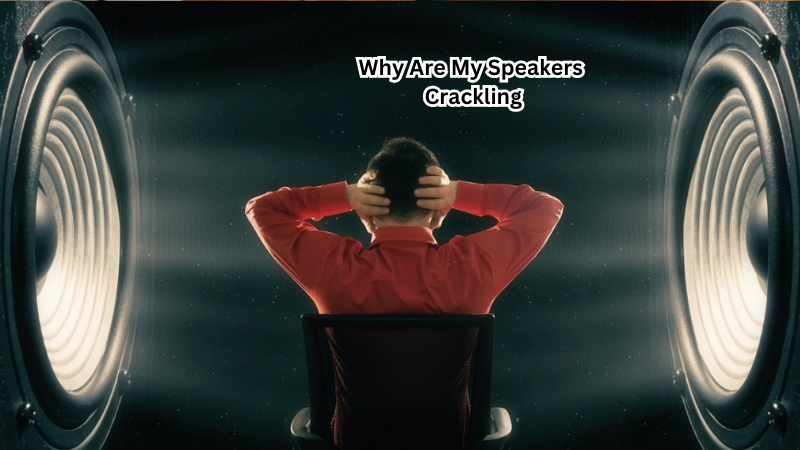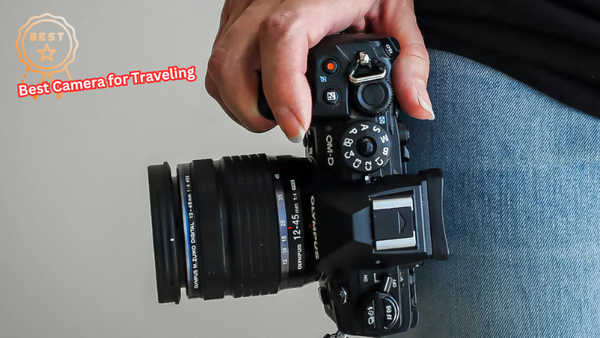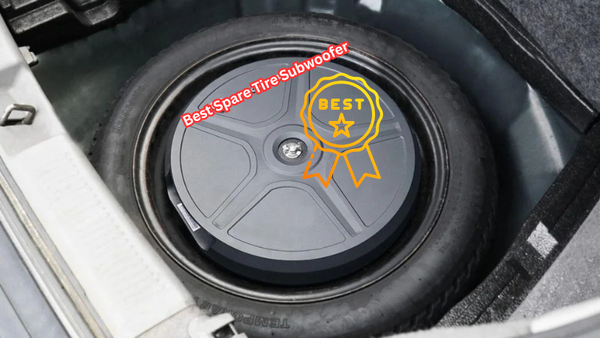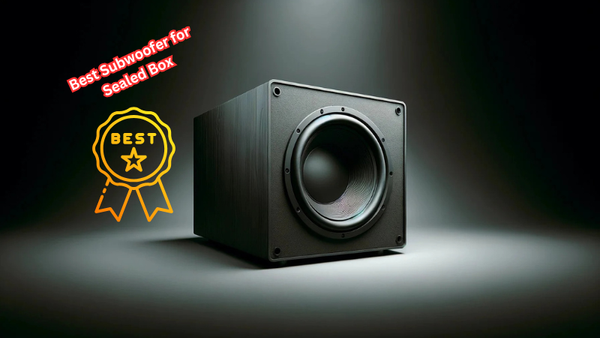If you've noticed the speaker crackling during playback, it could be a sign of an issue within your audio system. Crackling often stems from problems with the audio signal, which can cause sound distortion and impact your listening experience.
Several factors, including faulty connections, damaged speaker drivers, or interference within the audio equipment, can lead to this frustrating issue.
Understanding the root cause of speaker crackling is key to fixing it and preventing further damage to your system, ensuring a smooth, high-quality sound experience moving forward. This guide will discuss some of the common causes of speaker crackling and how to troubleshoot them.
Define Speaker Crackling
Speaker crackling is a common issue that manifests as popping or intermittent crackling sounds coming from your speakers during playback.
This type of audio distortion can affect the overall sound quality and disrupt your listening experience. It may occur in one or both speakers and can be heard across different sound systems, such as home theater systems, car audio systems, or portable speakers.
The crackling sounds are often described as static-like or distorted and can be caused by various factors, including electrical interference, damaged speaker components, or issues with the audio signal. Troubleshooting these potential causes can help identify and resolve the underlying problem causing your speakers to crackle.
Why Are My Speakers Crackling
Now that we have defined and identified speaker crackling, let's take a closer look at some of the common reasons why it may occur.
Faulty Connections
One of the most frequent causes of speaker crackling is faulty connections. Loose or damaged cables can disrupt the audio signal and result in crackling noises during playback. This issue can happen with any type of audio equipment, including home theater systems, computer speakers, or car audio systems.
To troubleshoot this problem, start by checking all your speaker cables for loose connections or damage. Make sure they are plugged in securely and not frayed or worn out. Using new high-quality cables can also help improve the overall sound quality and prevent further issues with crackling.
Damaged Speaker Components
Another potential cause of speaker crackling is damaged speaker components, such as the speakers' drivers or cones. These parts are responsible for producing sound and can become damaged over time due to wear and tear or accidents. When damaged, they can distort the audio signal, resulting in a crackling noise during playback.
If you suspect this may be the issue, you can visually inspect your speakers for any visible damage to the components. If you notice any signs of damage, it's best to get them repaired or replaced by a professional technician.
Interference within the Audio Equipment
Crackling noises from your speakers can also be caused by interference within your audio equipment. This interference can come from various sources, including nearby electronic devices or poor grounding of the audio system.
To troubleshoot this issue, try moving your speakers away from other electronic devices or switching to a different power outlet. You can also invest in a surge protector or dedicated power conditioner for your audio equipment to reduce any potential electrical interference.
Audio Settings
Sometimes, speaker crackling can be caused by incorrect audio settings on your playback device. For example, if the volume is set too high, it can result in distortion and cause crackling noises. Additionally, some equalizer settings may also lead to audio crackling if not properly adjusted.
To troubleshoot this issue, check your device's audio settings and make sure they are optimized for the type of speakers you are using. Additionally, try reducing the volume or adjusting any equalizer settings to see if it resolves the crackling.
Loose Internal Wiring
Another less common but possible cause of speaker crackling is loose internal wiring within the speakers themselves. Over time, vibrations from loud sounds can loosen wires and connections inside your speakers, leading to distortion in the audio signal.
To address this issue, you may need to open up your speakers and check for any loose wiring or connections. If you're not comfortable doing this yourself, it's best to seek assistance from a professional technician.
Sound system issues, such as speaker crackling, can be frustrating but are often fixable. Speakers pop and crackle for a variety of reasons, as we have discussed in this guide. By understanding the potential causes and troubleshooting them.
How to Fix Speaker Crackling Issues
Now that we've discussed some of the common causes of speaker crackling, let's look at how to troubleshoot and fix these issues.
- If the issue is caused by faulty connections, simply reseating or replacing the cables can often resolve the problem.
- For damaged speaker components, consider getting them repaired or replaced by a professional technician for optimal sound quality.
- To eliminate interference within your audio equipment, try moving your speakers away from other electronic devices and investing in surge protectors or power conditioners.
- Adjusting audio settings on your playback device can also help reduce crackling noises. Play around with volume levels and equalizer settings to find the best balance for your speakers.
- If loose internal wiring is the cause, it's best to seek professional help for repairs.
Crackling sound from your speakers can be a frustrating and disruptive issue, but with proper troubleshooting and maintenance, you can get rid of it and enjoy high-quality sound once again. If the speaker's crackle persists even after trying these solutions, it's best to seek assistance from a professional to identify and address the underlying problem.
Preventing Future Speakers Crackling
Here are some tips to prevent future speaker crackling issues:
Regularly Clean Speakers:
Dust and debris can build up on your speakers' components, distorting the audio signal. Regularly cleaning them with a soft cloth or compressed air can help prevent this issue.
Avoid Overloading Speakers:
Playing music at high volumes for extended periods can damage your speakers and lead to crackling noises. Keep the volume within a safe range to avoid any potential damage.
Use Quality Cables and Power Sources:
Investing in high-quality cables and power sources can significantly improve the sound quality and prevent interference that may cause speaker crackling.
Properly Configure Audio Settings:
Make sure your audio settings are optimized for the type of speakers you are using, as incorrectly configured settings can lead to distortion and crackling noises.
Regular Maintenance Checks:
Performing regular maintenance checks on your speakers, such as inspecting connections and cleaning components, can help identify any potential issues before they escalate into larger problems.
By following these tips, you can minimize the chances of experiencing speaker crackling in the future and ensure optimal sound quality from your audio system. Audio source quality is also essential in preventing speaker crackling, so make sure to use high-quality audio files and avoid streaming from low-quality sources.
FAQs
Is popping sound from speakers normal?
Occasional popping or clicking sounds from your speakers can be considered normal, especially when powering them on or off. However, if you hear consistent crackling noises during playback, it may indicate an issue with your audio equipment.
How do I know if my speaker is blown?
A blown speaker can produce various symptoms, including distortion in sound quality, sudden loss of volume, and crackling noises. Visually inspecting the components for any visible damage can also help determine if a speaker is blown.
Are expensive speakers less likely to crackle?
While more expensive speakers may have better quality components and construction, there is no guarantee that they will not experience crackling issues. Proper maintenance and care are essential for all types of speakers to prevent any potential issues.
Can damaged speaker components be repaired?
In some cases, damaged speaker components can be repaired by a professional technician. However, depending on the extent of the damage, it may be more cost-effective to replace the speaker instead.
Conclusion
Speaker crackling can disrupt your audio experience, often arising from faulty connections, damaged components, interference, or incorrect audio settings.
Identifying and troubleshooting these issues is crucial to restoring optimal sound quality. Regular maintenance, investing in quality cables, and configuring proper audio settings are preventive measures that can help avoid future crackling problems.
While such audio disturbances can be frustrating, they are generally fixable with the right approach, and professional assistance may be necessary if challenges persist. By addressing these concerns, you can ensure a high-quality sound experience and enjoy your audio system without interruptions, enhancing your overall listening pleasure.





